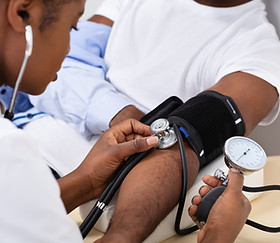
In an effort to help our employees become healthier, and to identify areas where they may be at risk, the LGHIB established the Worksite Wellness Program.
Employees and non-Medicare retirees who are enrolled in the Local Government Health Insurance Plan (Group 30000), along with their covered spouses, are eligible to participate in one wellness screening annually during the wellness qualifying period.
The health coaches performing the screenings are trained and experienced in assessing risk factors, providing education, and making recommendations to help members reach their wellness goals
Screening Period:
August 1, 2025 - July 31, 2026
DEADLINE:
July 31, 2026
Upcoming County-Hosted Screenings
Participation in the Annual Wellness Screenings is REQUIRED by Madison County in order to keep current preferred healthcare rates.
Quick & Easy...
Signing up is easy and screenings take just about 10 minutes!
SERVICE CENTER
1918 NORTH MEMORIAL PARKWAY
TUES FEB 3, 2026 11:30a-3:30p
JAIL (JAIL EMPLOYEES ONLY)
815 WHEELER AVE
TUES FEB 3, 2026 5:30p-7:00p
DISTRICT 1
9457 MOORES MILL RD
WED FEB 4, 2026 7:30a-9:30a
SHERIFF ANNEX
715 A WHEELER AVE
WED FEB 4, 2026 10:30a-1:00p
WASTE CONTROL
107 WHOLESALE AVE
WED FEB 4, 2026 2:30p-4:30p
PUBLIC WORKS
266 SHIELDS RD
THURS FEB 5, 2026 7:00a-10:30a
**7a-8a WILL BE FOR FIELD WORKERS ON A WALK IN BASIS**
HUMAN RESOURCES
819 COOK AVE
THURS FEB 5, 2026 12:00p-1:30p
If you are late to your chosen time...
You can still have your screening completed but you may experience a wait depending on the amount of those in front of you.
What to expect at your wellness screening

Comprehensive Lipid Profile
A lipid panel is a blood test that measures the amount of certain fat molecules called lipids in your blood. The panel measures triglycerides, LDL, HDL, and total cholesterol.
Healthcare providers use lipid panels to help assess someone’s cardiovascular health by analyzing cholesterol in their blood and to help diagnose other health conditions.

Blood Glucose Check
A blood glucose test measures the glucose levels in your blood. Glucose is a type of sugar. It is your body's main source of energy. A hormone called insulin helps move glucose from your bloodstream into your cells. Too much or too little glucose in the blood can be a sign of a serious medical condition.

Body Mass Index (BMI)
Body Mass Index (BMI) is a person’s weight in kilograms (or pounds) divided by the square of height in meters (or feet). A high BMI can indicate high body fatness. BMI screens for weight categories that may lead to health problems, but it does not diagnose the body fatness or health of an individual.

.png)